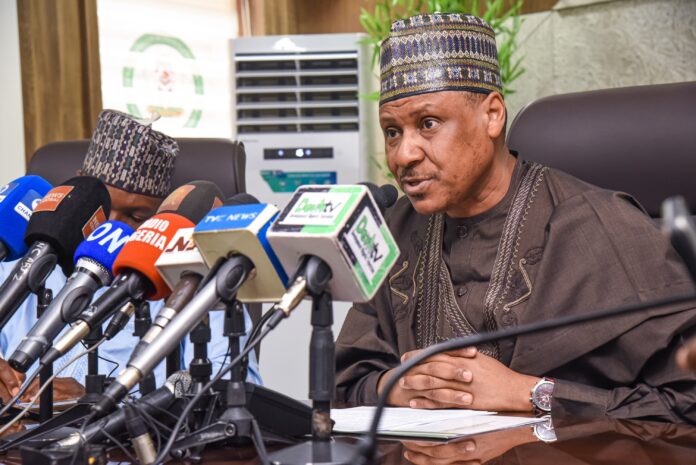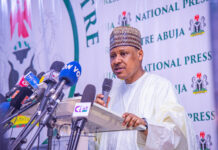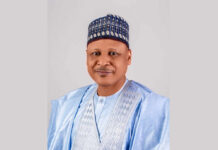SPEECH BY THE HONOURABLE MINISTER OF INFORMATION AND NATIONAL ORIENTATION, MOHAMMED IDRIS, fnipr, AT THE FIRST 2025 EDITION OF THE MINISTERIAL PRESS BRIEFING SERIES, AT THE CONFERENCE ROOM OF THE RADIO HOUSE, ABUJA, ON TUESDAY FEBRUARY 11, 2025.
Distinguished guests, ladies and gentlemen,
I welcome you to this edition of the Ministerial Press Briefing, the first one in 2025. You will recall that we launched this Briefing Series a year ago, as a platform for Ministers of the Federal Republic of Nigeria to present their scorecards to the people of Nigeria and the world.
President Tinubu is determined to ensure that his administration engages and communicates robustly, and this Ministerial Briefing Series is one of the measures he has directed to achieve this goal.
In 2024, we hosted 25 Ministers at these briefings and reached millions of people in Nigeria and abroad on traditional and digital media platforms.
These briefings are an opportunity to highlight and explain government policies, programs, and actions; to simplify and contextualise these for the benefit of all citizens, interest groups, and stakeholders at large; while also decisively tackling misinformation and disinformation.
Over the next three months, as we approach the second anniversary of President Bola Ahmed Tinubu’s Administration, we will bring Honorable Ministers to this platform, on a weekly basis.
This year 2025 is a year of consolidation, a year for building on the gains we have seen in the first 19 months of the administration. This maiden edition for 2025 is an opportunity to remind us of these gains, and to set the context in which these gains are being recorded, as we proceed into the mid-point of this administration.
I will group these gains that President Bola Ahmed Tinubu has recorded into the following key areas, as follows:
1. Fiscal, Macroeconomic and Legislative Reforms:
Fuel subsidy removal: This has helped plug leakages amounting to hundreds of billions of Naira annually.
FX transparency and stability: Various measures, including the introduction of the Electronic Foreign Exchange Matching System (EFEMS) last December, have resulted in unprecedented stability, and in the clearance of billions of dollars in FX backlogs that discouraged foreign investment. Last week, the Naira hit an eight-month high at the official foreign exchange market. According to the Nigerian Exchange Group, foreign capital inflow into the Nigerian Stock Exchange has risen from 4 percent in mid-2023 to an average of 16 percent at the end of 2024.
Oil and Gas reforms that in 2024 made Nigeria the most attractive destination for oil and gas investments in Africa, as well as attracting over $5 billion in signed investment commitments, known as Final Investment Decisions (FIDs).
Electricity Act: Building on a recent constitutional amendment, President Tinubu signed into law the 2024 Electricity Act which is now serving as a framework for State Governments to roll out their own regulated electricity markets.
Local Government Autonomy: In July 2024 the Supreme Court issued a landmark ruling empowering local governments with a level of financial autonomy hitherto unseen in the history of our country. President Bola Ahmed Tinubu has since empaneled an Inter-Ministerial Committee that will ensure the full enforcement of that judgement.
The NGX All Share Index ended 2024 with an annual growth of 37.65 percent, making it one of the best-performing stocks in the world in 2024.
2. Targeted Interventions:
Students Loan Fund – NELFUND has disbursed N32.8 billion to over 169,000 students (N20 Billion in school fees and N12.8 Billion in upkeep allowances)
Regional Development – President Bola Tinubu has signed Bills establishing Development Commissions for the North-Central, South-East, and North-West. Additionally, President Tinubu has assented to the Bill establishing the Federal University of Environmental Technology in Ogoniland, as well as assented to the long-awaited Act for the Maritime University in Okerenkoko, Delta State
Healthcare – Just last week the Federal Executive Council (FEC) approved the significant sum of $1.07 billion in low-cost financing for Nigeria from the World Bank, under the Human Capital Opportunities for Prosperity and Equity (#HOPE) program.
Also, the Federal Government through the National Health Insurance Authority (NHIA) is introducing targeted subsidies for cancer patients undergoing chemotherapy in Nigeria, with each patient benefiting up to a value of N400,000.
Under the Presidential Initiative to Unlock the Healthcare Value Chain established by President Tinubu in 2023, over 70 new healthcare manufacturing companies are engaging in active discussions with international financiers concerning the execution of 22 large-scale investment projects across Nigeria.
A year ago, President Tinubu approved the upgrade of key health infrastructure and equipment across all six geo-political zones, starting with the establishment of oncology and nuclear medicine centres in six teaching hospitals, and the development of critical healthcare service expansion projects in 10 additional federal hospitals, under the Health Sector Renewal Investment Initiative.
Passport Reforms – A backlog of over 200,000 international passports was cleared within a 3-week period in 2024, in fulfilment of our pledge to improve the efficiency of government operations.
Compressed Natural Gas: The Tinubu Administration has directly invested over $450 million in the development of Nigeria’s Compressed Natural Gas (CNG) value chain, through the Presidential CNG Initiative. This has helped unlock additional private sector financing, and the results are emerging speedily: from seven CNG conversion centers in Nigeria in 2023, we now have over 150 across the country and counting.
National Values Charter: Approved by the Federal Executive Council in 2024, this brainchild of the Federal Ministry of Information and National Orientation, through the National Orientation Agency, marks the beginning of a reset of our national attitudes and values in Nigeria. We are determined to achieve a fundamental restructuring of the social contract, empowering citizens to give their best to the country while also expecting and demanding the best from the country.
3. Infrastructure:
Nigeria is a vast construction site under President Bola Ahmed Tinubu. At the last Federal Executive Council (FEC) meeting, just last week, over 2.5 Trillion Naira worth of road infrastructure projects were approved – which is unprecedented in the history of our country:
N1.334 trillion for additional sections of the Lagos-Calabar Coastal Highway.
N470.9 billion and N148 billion for the access roads to the Second Niger Bridge from Delta and Anambra States respectively.
N195 billion for the reconstruction of Phase 2, Section 1 of the Lagos-Ibadan Expressway, under the Presidential Infrastructure Development Fund (PIDF)
305 billion Naira for the reconstruction of three sections of the Lokoja-Benin road (Obajana to Benin; Auchi to Edo; and Benin Airport Area)
N5.4 billion for the Ado-Ekiti–Igede Road.
N22 billion for the Onitsha-Owerri expressway.
N18 billion for the Wusasa-Jos Road linking Kaduna and Plateau States.
N12.75 billion for road projects linking Abia and Enugu States.
Restructuring of the Abuja-Kaduna-Zaria-Kano road project, with new contractors, new extensions at the Abuja and Kano ends, and solar lighting for the entire route.
Let me say very clearly that all these do not represent an exhaustive list; there are many ongoing projects as we speak. From the Port Harcourt and Warri Refineries that have come back to life, to the approval of N80 billion for the reconstruction of the failed Alau Dam in Borno, to the progress on the construction of the Kano-Kaduna Standard Gauge Railway Line, there is no part of Nigeria that has been left behind in this massive allocation of infrastructure investments under President Tinubu.
4. Defence and Security:
in 2024, our security forces neutralized more than 8,000 terrorists and bandits, and arrested 11,600 others, with more than 10,000 weapons recovered.
Additionally, about 8,000 kidnap victims were successfully rescued. We will continue to work to drive down the number of victims while scaling up our success stories in terms of deterrence, crime-solving, and prosecutions.
The establishment, by the Office of the National Security Adviser, with the support of the United Kingdom’s National Crime Agency, of a Multi-Agency Anti-Kidnap Fusion Cell (MAAKFC) in December 2024. This new initiative marks a major step forward in the strategic coordination of our ongoing fight against kidnapping.
We have officially declared the Lakurawa armed group a terrorist organisation, based on the ruling of a Federal High Court, and proscribed it. With this designation, our security forces can apply maximum force against these terrorists.
The ongoing implementation of e-gates at our International Airports, in partnership with INTERPOL, has already started yielding results – making it easier for our security agencies to apprehend persons of interest and keep our country safer. While we still have a lot of work ahead, our highways have grown safer. The hitherto notorious Abuja-Kaduna highway is one example. As I said, there’s still much more to be done, and we will not relent in our efforts.
5. Food Security
Nigeria now has a Ministry of Livestock Development, to harness what is potentially a multi-billion-dollar agricultural opportunity that can transform our rural communities and enrich and empower tens of millions of Nigerians, including women and youth. Indeed, the price of grains has dropped significantly across the country.
2025 Budget: On December 18, 2024, President Bola Ahmed Tinubu presented the 2025 National Budget to the National Assembly with a proposed sum of N49.7 trillion, which showed a significant increase from the N27.5 trillion proposed in 2024.
As we may all recall, President Tinubu, on February 5, 2025 wrote to the National Assembly that the 2025 proposed budget be raised to N54.2 trillion, because of the availability of an additional N4.53 trillion revenues generated by the FIRS, Customs Service and other government-owned enterprises.
The 2025 budget proposal, christened the “Budget of Restoration,” is essentially hinged on “Securing Peace” and “Rebuilding Prosperity” in our dear nation. The top four priorities of the budget, in terms of allocation, are therefore:
- Security – N4.91 trillion (9.88%)
- Infrastructure – N4.06 trillion (8.17%)
- Education – N3.52 trillion (7.08%)
- Health – N2.48 trillion (4.99%)
As we await the passage of the 2025 Appropriations Bill by the National Assembly, it is obvious that President Tinubu is planning a great future for Nigeria, starting with the attainment of peace, the provision of infrastructure, and the unprecedented investment in our teeming youth through quality education, and the assurances of effective healthcare for all.
Distinguished guests, gentlemen of the press,
I will close by asserting that, on account of the bold efforts of President Bola Ahmed Tinubu, we are seeing the following taking shape across the land: Greater fiscal headroom at all levels of government, a reformed and less burdensome tax regime, a landscape transformed into a giant construction site, more money in the pockets of Nigerians, through student loans, cash transfers, business grants, and many more.
All of these are here to stay and endure, and will forever be remembered as the true legacy of President Tinubu’s reform agenda. True to the promise of his campaign, President Tinubu is bringing renewed hope to all Nigerians, male and female, young and old, in every corner of the country.
I invite all Nigerians to take advantage of these various opportunities and to please rest assured that the best is yet ahead. This journey of reformation and transformation that we have started will yield the desired fruit, and no one will be left behind.
I thank you for listening, and God bless the Federal Republic of Nigeria.
Mohammed Idris, fnipr
Minister of Information and National Orientation
Abuja, Nigeria
11 February 2025






